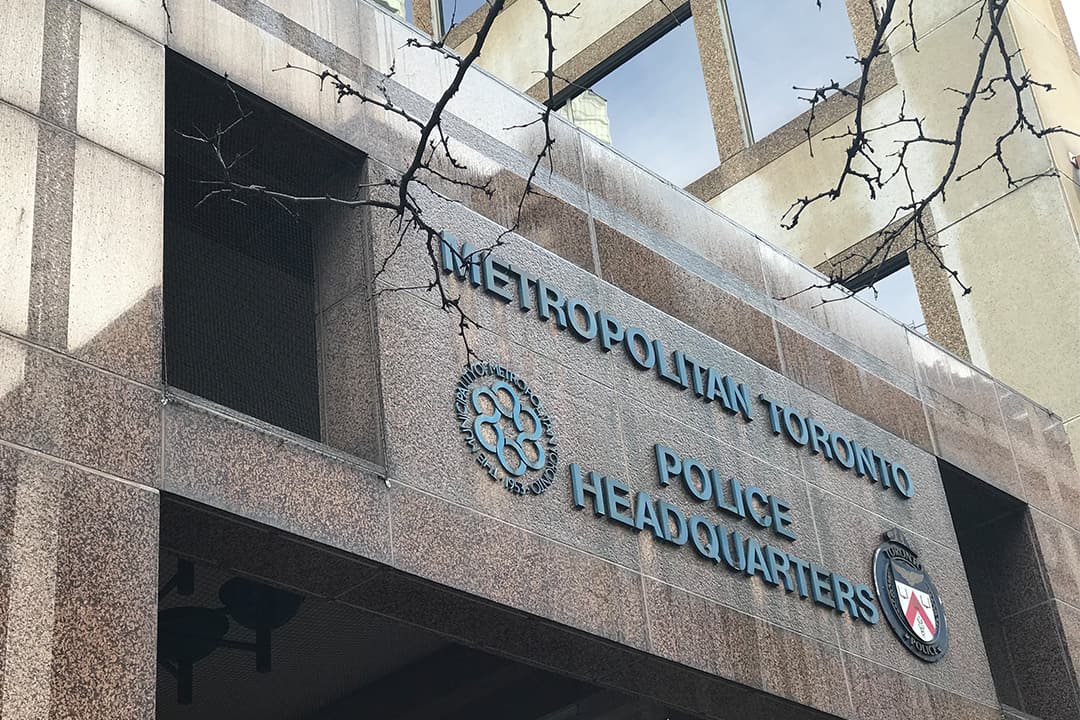Content warning: This article contains descriptions of violence and mentions Islamophobia and antisemitism.
One of the most powerful moments in Toronto’s pro-Palestine movement was when two separate protests merged at 52 Division Police Service last December.
On December 10, two pro-Palestine protests converged at 52 Division Police Service in downtown Toronto, resulting in thousands of individuals occupying Dundas Street West to demand the immediate release of a protester who was arrested. The individual was arrested for allegedly tackling a Toronto Police Service (TPS) officer during a pro-Palestine protest, but several individuals claim that the protester was defending a cyclist that TPS officers pushed to the ground.
It is no surprise when police revert to reactionary and aggressive tactics in times of heightened conflict. It is such moments that remind us of what I believe to be the truth: the TPS community policing mandate of attempting to create a partnership between police and the community is a false front behind which disparity continues to persist. In my view, the pro-Palestine protests reveal how the TPS continues to target minoritized groups and meet protesters with violence, ultimately working against the well-being of Toronto’s community.
Public Safety Canada defines community policing as a philosophy that “support[s] the systematic use of partnerships and problem-solving techniques to proactively address the immediate conditions that give rise to public safety issues such as crime, social disorder, and fear of crime.” Deconstructed, community policing allows the public to play a role in addressing public safety problems that the police may overlook. The TPS has attempted to implement community policing through initiatives such as the neighbourhood community officer program.
On paper, community policing is an active step toward improving police-citizen relations, but in practice, it is vulnerable in the face of disruptive citizen practices — including protests. We have yet to see the TPS implement applicable and reliable community policing practices, and I see this as a testament to the TPS’ failure to substantiate its community policing initiatives.
When contextualizing this failure at the pro-Palestine protests, it becomes clear to me that this community policing is selective. Pro-Palestine demonstrations were recently banned on the Avenue Road overpass and TPS Chief Myron Demkiw assured citizens that the police will be applying a “criminal lens” to protests in the city. How does criminalization fit into the proactive, problem-solving approach that was promised by the TPS’ community policing guidelines?
Repeated police mistreatment of protesters reveals an uncomfortable truth: the police do not always exist to serve and protect. Rather, the police organization often works in conjunction with oppressive systems by targeting, silencing, and punishing minoritized groups.
Does community policing truly apply to all Canadian communities? Does it apply when those who require protection and support are directly challenging the status quo? I interpret the TPS’ treatment of pro-Palestine protesters to be a direct and negative answer to these questions.
It is important to note that there has been a rise in Islamophobia and antisemitism since the October 7 attacks. Groups that are already vulnerable to hate-motivated attacks are now facing increased threats, and the police are crucial in denouncing hate-motivated attacks through criminalization and arrest. Despite this precarious situation, peaceful protesters continue to be criminalized and pro-Palestinian messages are aligned with hate speech, reinforcing harmful ideologies that incite hate-fueled attacks to begin with.
Of course, both protests and protesters can become unruly, aggressive, and even violent at times. Despite this, I believe that TPS officers should not be regressive in their response. The ideological framework of community policing should extend into all areas of policing, especially in situations where the community is directly interacted and engaged with. Police training should emphasize de-escalation and crowd management, and community partnerships should be at the core of police response to protests.
To me, the December 10 protests were symbolic in demonstrating that contemporary police practices are oppressive in nature. The oppression of marginalized voices is rampant in our own communities. Acknowledging these lived realities and accepting the needs of diverse communities are crucial steps in crafting an appropriate and productive response to protest — unfortunately, this is a step that the TPS has yet to take.
Ayesha Firoz is a third-year student at Victoria College studying criminology and sociolegal studies and sociology. She is a Local Affairs columnist for The Varsity’s Comment section.
If you or someone you know has experienced harassment or discrimination based on race, ancestry, place of origin, colour, ethnic origin, citizenship and/or creed at U of T, report the incident to the Anti-Racism and Cultural Diversity office: https://antiracism.utoronto.ca/help/.
You can report incidents of anti-Muslim racism through the National Council of Canadian Muslims’ Hate Crime Reporting form at https://www.nccm.ca/programs/incident-report-form/, and antisemitic incidents at U of T to Hillel U of T at https://hillelontario.org/uoft/report-incident/.
If you or someone you know is in distress, you can call:
- Canada Suicide Prevention Service phone available 24/7 at 1-833-456-4566
- Good 2 Talk Student Helpline at 1-866-925-5454
- Connex Ontario Mental Health Helpline at 1-866-531-2600
- Gerstein Centre Crisis Line at 416-929-5200
- U of T Health & Wellness Centre at 416-978-8030



No comments to display.